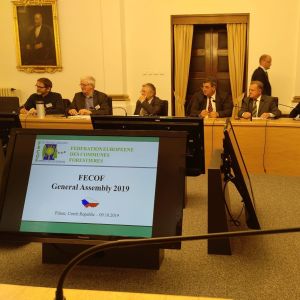 GImmediately after the arrival and welcome of the participants at the airport, a visit to the forestry and wood science faculty of the University of Prague was on the programme. Here the responsible Director of the Ministerial Forestry Department introduced the forestry of the Czech Republic and in particular showed the current dramatic forest situation of the country. The biggest problems facing the forest owners are the rapidly changing environmental conditions and the lack of human resources, which severely restrict the implementation of necessary forest protection and forest management measures. With around 17% of forest ownership share, the cities and municipalities in the Czech Republic are directly affected by the enormous forest damage caused by bark beetles and drought. The Ministry supports the forest owners essentially with blanket funding rates for necessary measures of bark beetle control (harvesting, transport and storage of damaged wood). In the overarching context increasing European funding to support forest owners is planned for the
GImmediately after the arrival and welcome of the participants at the airport, a visit to the forestry and wood science faculty of the University of Prague was on the programme. Here the responsible Director of the Ministerial Forestry Department introduced the forestry of the Czech Republic and in particular showed the current dramatic forest situation of the country. The biggest problems facing the forest owners are the rapidly changing environmental conditions and the lack of human resources, which severely restrict the implementation of necessary forest protection and forest management measures. With around 17% of forest ownership share, the cities and municipalities in the Czech Republic are directly affected by the enormous forest damage caused by bark beetles and drought. The Ministry supports the forest owners essentially with blanket funding rates for necessary measures of bark beetle control (harvesting, transport and storage of damaged wood). In the overarching context increasing European funding to support forest owners is planned for the 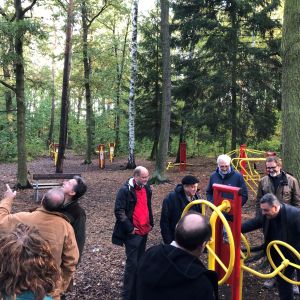 nearer future.
nearer future.
The head of the forestry faculty, Prof. Marek Turcani and the forest scientist Dr. Miroslav Svoboda provided a deeper insight against the background of the current bark beetle plague. They note: For the first time in the history of forestry in the Czech Republic, bark beetles are the most important forest damage factor. Indeed, this situation’s cause is multifactorial. There is a very large proportion of susceptible spruce monocultures in the Czech Republic. In addition, the number of employees in the forestry sector has fallen sharply in recent decades. Caused by drought and warm temperatures, the bark beetle mass reproduction can not be sufficiently contained under those conditions. Complex tender processes for hiring forest contractors are not appropriate to implement bark beetle control measures as quickly as necessary. In addition, many forest owners, especially private ones, have lost interest in their forest. Considering the refo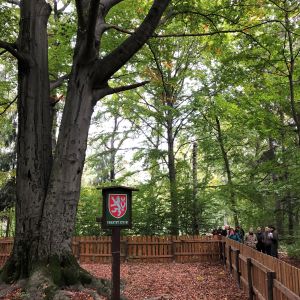 restation of the affected areas, Dr. Svoboda recommended a greater focus on using natural reforestation processes in order to establish a diverse, well-structured and thus risk-reduced future forest generation. In this sense, the scientist sees today's crisis as an opportunity for the forest of tomorrow. However, a prerequisite for the natural reforestation of mixed forest stands is an adapted management of hoofed game, as Prof. Turcani finally noted.
restation of the affected areas, Dr. Svoboda recommended a greater focus on using natural reforestation processes in order to establish a diverse, well-structured and thus risk-reduced future forest generation. In this sense, the scientist sees today's crisis as an opportunity for the forest of tomorrow. However, a prerequisite for the natural reforestation of mixed forest stands is an adapted management of hoofed game, as Prof. Turcani finally noted.
Thereafter, the FECOF members were very impressed by the faculty's new teaching and research facilities, which enable the best possible education for young forestry scientists. Modern teaching rooms, powerful "supercomputers", 3D printers, high-resolution electronic microscopes and an arboretum on the roof of the new building: Here, everything that makes up modern forestry education has been taken into consideration. The recently completed building project was supported to a considerable extent 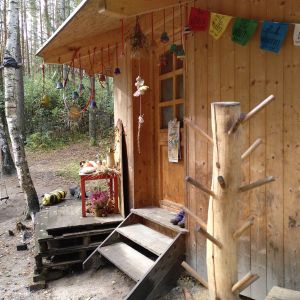 by EU funds.
by EU funds.
On the following day, an excursion to the municipal forest operation of the city of Pilsen started early in the morning. There, the variety of tasks and thus the specificity of communal forest ownership became apparent. Central purpose of the communal land management is the recreation of the local population. Water management, natural and environmental education, sports and health facilities should be mentioned as keywords. The highlight of the excursion was a guided tour of the city-owned forestry arboretum "Sofronka". The pine cultivation experiments made it clear how differently various tree species and provenances are able to cope with certain local conditions. In this respect, such forest-scientific experimental areas are an important basis for today's and future forestry decisions.
The following assembly in the town hall of the city of Pilsen was all about 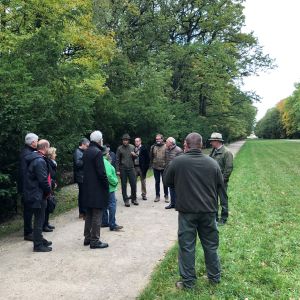 the current problematic situation of forestry in Europe and the consequences of climate change for future forests ecosystems. In his welcome, the president of SVOL, Mr. Frantisek Kucera made clear, that the small municipalities in particular suffer greatly from the enormous forest damage due to drought and bark beetles in the Czech Republic. Out of their own resources, they can not cope with the great challenge of making their forest fit for the future and consequently, they are increasingly in need of society’s support. The President of FECOF, Mr. Pierre Grandadam, emphasized in his welcome speech the importance of the communal forest ownership as a mediator between politics and the people. The important task of municipal forest owners is therefore to strengthen the social acceptance of multifunctional, sustainable forest management in dialogue with their citizens. The cornerstones of this are transparency, mutual trust and the ability to deal critically with one's own actions. However, exemplary forest management is not at zero costs. Faced with the urgent need
the current problematic situation of forestry in Europe and the consequences of climate change for future forests ecosystems. In his welcome, the president of SVOL, Mr. Frantisek Kucera made clear, that the small municipalities in particular suffer greatly from the enormous forest damage due to drought and bark beetles in the Czech Republic. Out of their own resources, they can not cope with the great challenge of making their forest fit for the future and consequently, they are increasingly in need of society’s support. The President of FECOF, Mr. Pierre Grandadam, emphasized in his welcome speech the importance of the communal forest ownership as a mediator between politics and the people. The important task of municipal forest owners is therefore to strengthen the social acceptance of multifunctional, sustainable forest management in dialogue with their citizens. The cornerstones of this are transparency, mutual trust and the ability to deal critically with one's own actions. However, exemplary forest management is not at zero costs. Faced with the urgent need 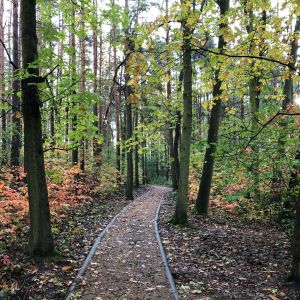 across Europe to adapt forests to changing environmental conditions and thus preserve their diverse services to nature and people, the assembled FECOF members adopted the joint statement "Forest Owning Municipalities at the Crossroads of Climate Change".
across Europe to adapt forests to changing environmental conditions and thus preserve their diverse services to nature and people, the assembled FECOF members adopted the joint statement "Forest Owning Municipalities at the Crossroads of Climate Change".
On the following day, the conclusion of the event was a visit to the Parks Department of the city of Prague. The excursion illustrated the problems and solutions in connection with the topic "Urban Forestry". With great effort, the city ensures that both the interests of the population and of nature are given sufficient consideration in urban green spaces. Given the 1.3 million inhabitants of the state capital, this is a great challenge for the city employees, which has to be mastered every day anew. In the end, Mr. Grandadam warmly thanked the hosts for organizing this year's FECOF General Assembly, noting that it has been a very successful event for all involved, reflected in the many interesting discussions and valuable impressions..

